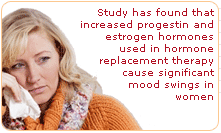Menopausal women undergoing hormonal replacement therapy (HRT) may experience adverse mood swings to the progestin and estrogen hormones, an effect which is more severe in women with a history of premenstrual syndrome (PMS), researches say.
Although estrogen has been found to have a favorable emotional and physical effect in menopausal women, the study found that when augmented levels of estrogen are combined with progestin, mood often worsens.
To examine this problem, a team of investigators led a study on 38 perimenopausal women from December 2000 to November 2001. The women logged their symptoms daily during sequential hormone replacement therapy.

In the progestin cycle of HRT, women noted severe mood swings, including irritability and depression, especially if the progestin was combined with augmented levels of estrogen. Although it was previously thought that progestin is the chief cause of negative mood experienced in HRT, this study shows that when combined with progestin, estrogen is a factor, as well.
Furthermore, women with a history of premenstrual symptoms will most likely suffer from more acute mood changes during HRT, suggests an article found in Climateric. The doctors followed 106 women during sequential HRT, gauging their emotional and physical symptoms in response to the treatment. The study concluded that women who had a history of PMS suffered increased mood swings, depression, tension and irritability in response to the progestin and estrogen in HRT as compared to women who had not suffered from PMS.
It is important that women with a history of PMS be aware of the possible negative effects HRT can have on their mood before engaging in this line of treatment.